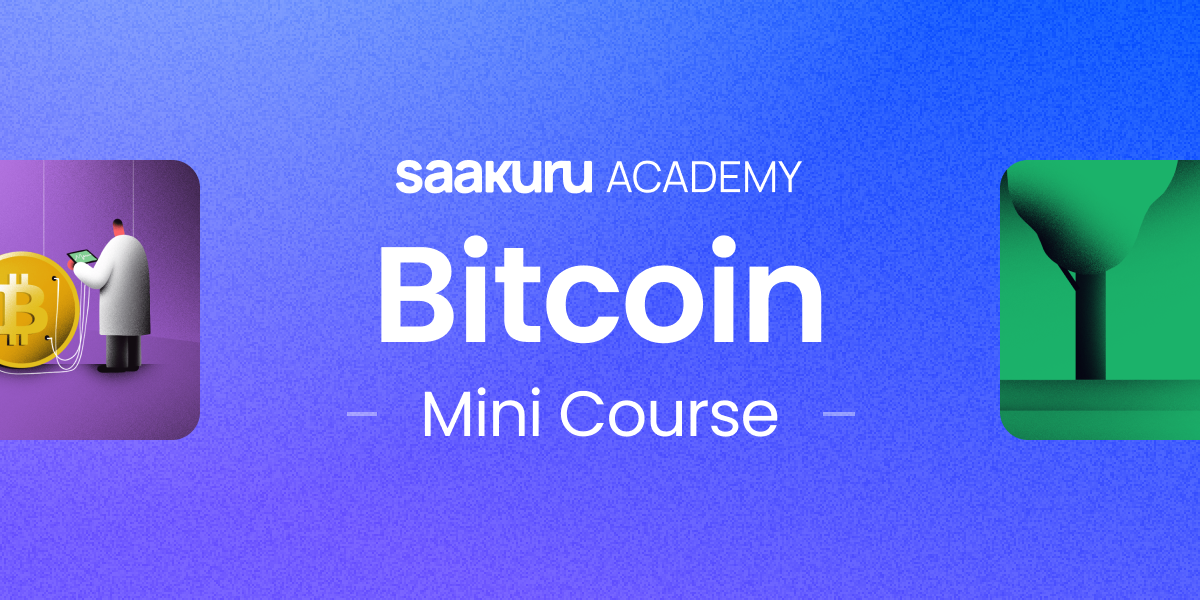If you’ve chosen to start investing in cryptocurrency, it’s important to think about what kind of exchange you’ll want or need to use in order to buy the coins and tokens you’re interested in. The majority of cryptocurrencies in existence today, particularly those that are new, are only available from decentralized exchanges (DEX).
Decentralized exchanges, which are different from centralized exchanges in a number of important ways, have been growing in popularity in recent years, and it’s likely you’ll need to use at least one of them at some point in the future. In this AAG Academy guide, we’ll teach you what decentralized exchanges are and why they’re so important.
How does a decentralized exchange (DEX) work?
Decentralized exchanges are powered by the blockchain and rely on non-custodial cryptocurrency wallets, which users need to hold their tokens. Those wallets must be connected to an exchange before a transaction can be carried out, and they must already be holding cryptocurrency of some kind. DEXs do not accept conventional fiat cash.
With that being the case, users have to acquire coins or tokens from another source first — be it a centralized exchange (CEX) or a friend — and have access to them through a non-custodial wallet, such as MetaMask, Trust Wallet, or the new AAG Wallet. That wallet can then be used to connect to a DEX, which is essentially just a decentralized app (DApp).
Once your wallet has been paired with a DEX, the cryptocurrency you’re already holding can be swapped or converted into other coins and tokens. This is the only way to acquire many of the cryptocurrencies in existence today, since most are not available to purchase directly through a centralized exchange.
A decentralized cryptocurrency exchange is the opposite of a centralized exchange. There is no company, central organization, or individual in control. There is also no third-party or middleman involved in decentralized exchange transactions, which are peer-to-peer and entirely automated by programs called smart contracts that operate on the blockchain.
Furthermore, decentralized exchanges are completely unregulated and can be used mostly anonymously — unlike centralized exchanges, which are regulated and require identity verification. It is also worth noting that there are several different types of DEX which operate a little differently. These are:
On-chain order book
Some decentralized exchanges use an on-chain order book, which means that every action, including modifications and cancellations, is recorded on the blockchain. This is the most transparent approach and it negates the need for a third-party of any kind, but since it requires more work, there are higher fees and processing times involved.
Examples of on-chain order book models include Stellar’s DEX and Bitshares.
Off-chain order book
Other decentralized exchanges operate in a similar way on the surface, but they instead use an off-chain order book, which means orders are stored elsewhere — off the blockchain. It also means these exchanges have some centralized elements that aren’t open to everyone. This poses certain risks and requires users to trust the exchange with their data.
A good example of this is the 0x protocol for ERC-20 and other tokens used on the Ethereum blockchain. Instead of acting as a single DEX, the protocol offers a framework for parties known as “relayers” to manage off-chain order books. Using 0x smart contracts and other tools, hosts can take advantage of a combined liquidity pool and pass orders between users. Trades are only executed on-chain once parties are matched.
This approach offers greater usability than on-chain order books, and it also tends to be faster and more affordable than on-chain order books since there is less blockchain work involved.
Off-chain order book implementations include Binance DEX, IDEX, and EtherDelta.
Automated Market Makers (AMM)
Automated Market Makers (AMM) are entirely unique in that they do away with order books altogether. They do not require “makers” or “takers” — only users and some clever smart contracts. Each AMM uses a different implementation, but in general, they tend to take advantage of a bunch of smart contracts that are tied together to automate everything.
AMMs offer innovative incentives to ensure user participation, and they integrate with decentralized wallets like MetaMask and Trust Wallet to provide a relatively user-friendly experience. Like other DEX options, AMMs record all order data on the blockchain.
AMM exchanges include Uniswap and the Kyber Network, both of which support ERC-20 tokens.
What are the advantages of DEX?
Decentralized exchanges offer a number of big advantages over centralized exchanges, including:
- Availability
As we’ve already touched upon above, using a DEX provides access to a significantly wider range of cryptocurrency tokens, including those from new projects, which are not available through a CEX.
- Security
The decentralized nature of a DEX makes them much more secure than centralized systems because there is no single entity that can be targeted by attackers.
- Zero regulation
Decentralized exchanges are completely free from regulation, and while this may be seen as a disadvantage to some, it’s a huge advantage to others.
- Privacy
Because DEXs don’t have to abide by financial regulations, there’s no need for them to confirm a user’s identity. That means decentralized exchanges can be used mostly anonymously.
- Low costs
Thanks to smart contracts that automate DEX processes, fees for swapping tokens are typically lower.
- Low risk
Because decentralized exchanges themselves don’t hold your digital assets, there’s no need to worry about losing your investments if a DEX folds. Your non-custodial wallet — which is not tied to a DEX in anyway — and everything in it is safe.
What are the disadvantages of DEX?
Decentralized exchanges have some disadvantages, too. These include:
- Accessibility
The process of using a DEX is not as user-friendly as using a CEX, and therefore decentralized exchanges aren’t as accessible as centralized exchanges for cryptocurrency newcomers. They require you to first create a non-custodial wallet and then acquire cryptocurrency tokens elsewhere before they can be swapped.
- No support
Decentralized exchanges do not offer official support channels like centralized exchanges. That means that if things go wrong, you’re pretty much on your own.
- Lower liquidity and trading volumes
Trading volumes on DEXs are still significantly lower than those on CEXs, which also leads to lower liquidity. That means it can be more difficult to trade at a fair price, and there may be lower demand for the cryptocurrencies you want to trade.
How do you interact with DEX?
Before interacting with a DEX, you need a non-custodial wallet and cryptocurrency of some kind, such as Ethereum. Many of these come with a built-in DApps browser, which lets you visit an exchange and then connect your wallet as seamlessly as possible. Once your wallet is connected, you can trade the assets you already hold for other cryptocurrency tokens.
If your wallet does not include a built-in DApps browser, you can simply visit the exchange in a normal web browser, then use the “connect wallet” function to pair your wallet. This is usually as simple as scanning a QR code with your smartphone — assuming the wallet you’re using is a mobile one.
Some of the most popular decentralized exchanges are Uniswap, PancakeSwap, and SushiSwap.
References
Frequently Asked Questions
Popular decentralized exchanges include Uniswap, Sushiswap, PancakeSwap, 0x Protocol, KyberSwap, and AtomicDEX.
Like centralized exchanges, decentralized exchanges have their own risks, but those are mostly around liquidity. The likelihood of them being hacked is incredibly low since a DEX does not operate from a single source — it is shared among a blockchain.
Yes, there are fees involved when using a DEX, and these can vary quite significantly depending on the blockchain protocols involved. ERC-20 exchanges like Uniswap are typically more expensive to use because of their “gas” fees.
 Saakuru Blockchain
Blockchain with no gas fee
Saakuru Blockchain
Blockchain with no gas fee
 Saakuru App
All-In-One crypto wallet
Saakuru App
All-In-One crypto wallet
 Saakuru SDK
Embed Web3 wallet easily
Saakuru SDK
Embed Web3 wallet easily
 dApp Store
Discover Thousands of dApps
dApp Store
Discover Thousands of dApps
 Saakuru Games
Guild Management Tool
Saakuru Games
Guild Management Tool
 TomoOne
Grow virtual pet
TomoOne
Grow virtual pet
 Saakuru Cashback
Shop online with discount
Saakuru Cashback
Shop online with discount
 Saakuru Blockchain
Blockchain with no gas fee
Saakuru Blockchain
Blockchain with no gas fee


 Saakuru App
All-In-One crypto wallet
Saakuru App
All-In-One crypto wallet


 Saakuru SDK
Embed Web3 wallet easily
Saakuru SDK
Embed Web3 wallet easily


 dApp Store
Discover Thousands of dApps
dApp Store
Discover Thousands of dApps


 Saakuru Games
Guild Management Tool
Saakuru Games
Guild Management Tool


 TomoOne
Grow virtual pet
TomoOne
Grow virtual pet


 Saakuru Cashback
Shop online with discount
Saakuru Cashback
Shop online with discount















